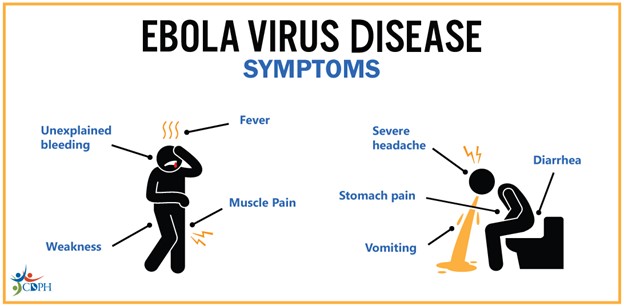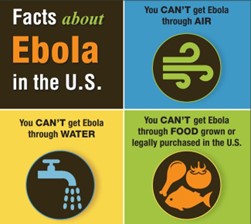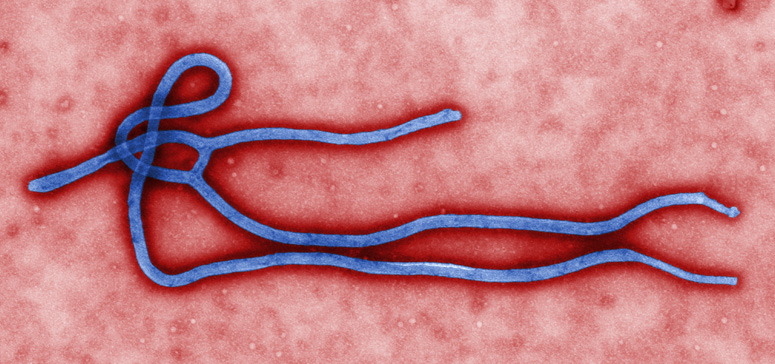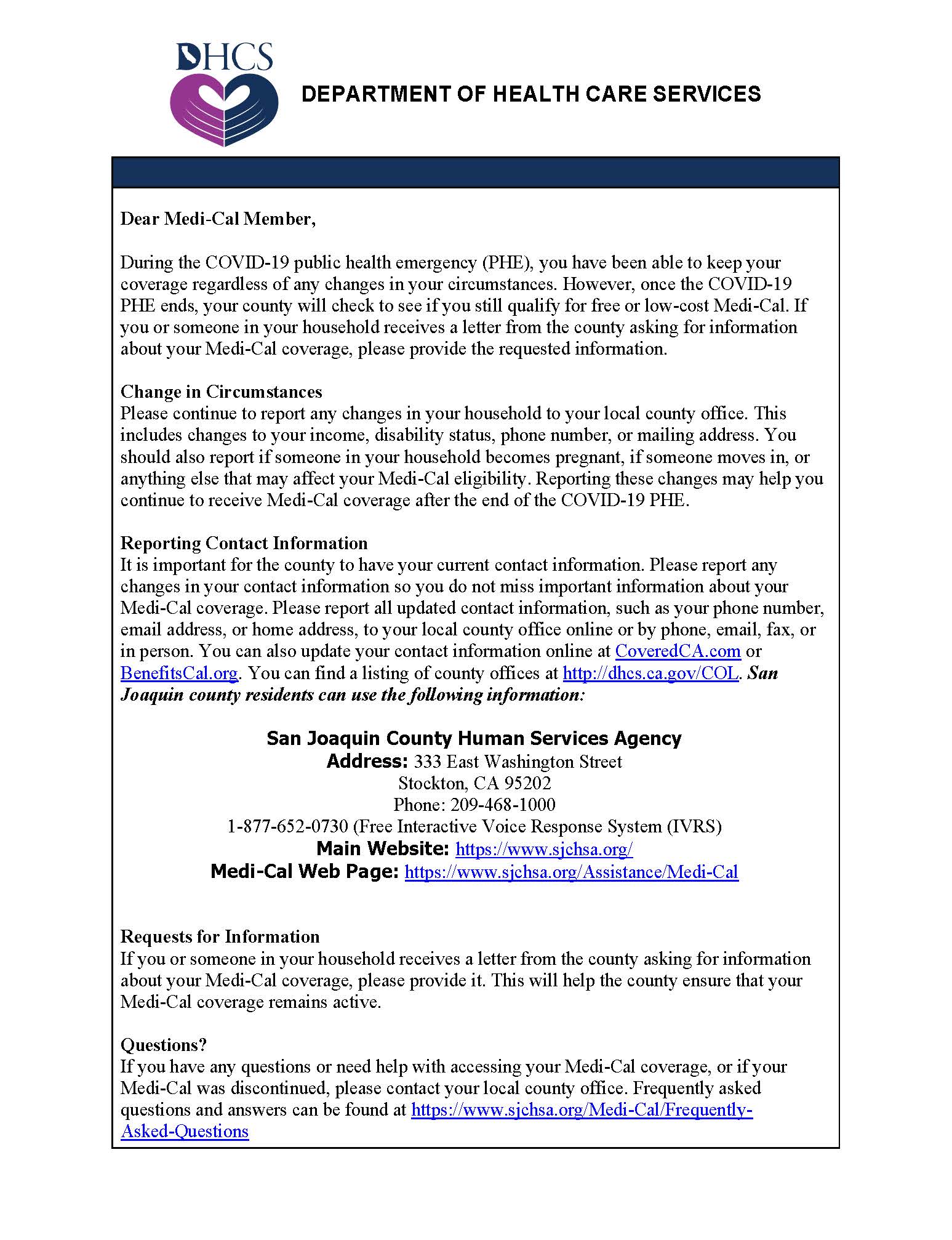Ebola Virus Disease (EVD)
The California Department of Public Health (CDPH), in collaboration with the U.S Centers for Disease Control and Prevention (CDC), is closely monitoring an outbreak of Ebola virus disease (EVD) due to the Sudan virus (species Sudan ebolavirus) in Central Uganda. On September 20, 2022, Uganda health authorities declared an outbreak of EVD following laboratory confirmation of a patient from Mubende district in Central Uganda. As of October 6, 2022, a total of 74 confirmed cases and 39 deaths have been identified in Uganda.
The risk of importation of EVD into California is currently very low. Nevertheless, CDPH reminds all healthcare providers in hospitals, emergency departments, clinics, and other outpatient settings to routinely ask patients with acute, possibly infectious illness about recent travel, including international travel to Uganda.
Definition
Ebola Virus Disease (EVD), previously known as Ebola hemorrhagic fever, is a rare and deadly disease caused by infection with one of the Ebola virus strains. Ebola can cause disease in humans and nonhuman primates (monkeys, gorillas, and chimpanzees).
Symptoms
- Fever
- Severe headache
- Muscle pain
- Weakness
- Diarrhea
- Vomiting
- Stomach pain
- Unexplained bleeding or bruising
Symptoms may appear anywhere from 2 to 21 days after exposure to Ebola, but the average is 8 to 10 days. Recovery from Ebola depends on good supportive clinical care and the patient’s immune response.

Transmission
Someone will not get EVD from casual contact. It is not passed through the air like the flu, nor is it carried in food or water. EVD becomes contagious once symptoms appear.
Person-to-person transmission of EVD occurs through direct contact with bodily fluids (i.e., blood, urine, saliva, sweat, feces, vomit, breast milk, amniotic fluid, and semen) of a person who is sick with, recovering from or died from EVD. It can also be transmitted through oral, vaginal or anal sex by the semen from a man who has recovered from EVD.
EVD can also spread through items that may have come in contact with an infected person’s bodily fluids (i.e., needles, syringes, clothing, bedding, medical equipment, etc.).

For more information see the CDC Ebola Virus Tranmission info page http://www.cdc.gov/vhf/ebola/transmission/index.html
Testing and Treatment
Diagnosis of Ebola is based on a variety of laboratory tests and clinical symptoms.
Currently there are no specific vaccines or medicines (such as antiviral drug) that have been proven to be effective against Ebola. Symptoms of Ebola are treated as they appear. The following basic interventions, when used early, can significantly improve the chances of survival:
- Providing intravenous (IV) fluids and balancing electrolytes (body salts)
- Maintaining oxygen status and blood pressure
- Treating other infections if they occur
Timely treatment of Ebola is important but challenging since the disease is difficult to diagnose clinically in the early stages of infection. Because early symptoms such as headache and fever are not specific to Ebolaviruses, cases of Ebola may be initially misdiagnosed.
Experimental treatment has been tested and proven effective in some animals but has not yet been evaluated in humans.
Prevention
Although there is an FDA-approved vaccine available for Zaire Ebolavirus, there is not one for the most recent outbreak of Sudan Ebolavirus.
When living in or traveling to a region where Ebola virus is potentially present, there are a number of ways to protect yourself and prevent the spread of EVD.
- Avoid contact with blood and body fluids (such as urine, feces, saliva, sweat, vomit, breast milk, amniotic fluid, semen, and vaginal fluids) of people who are sick.
- Avoid contact with semen from a man who has recovered from EVD, until testing shows that the virus is gone from his semen.
- Avoid contact with items that may have come in contact with an infected person’s blood or body fluids (such as clothes, bedding, needles, and medical equipment).
- Avoid funeral or burial practices that involve touching the body of someone who died from EVD or suspect EVD.
- Avoid contact with bats, forest antelopes, and nonhuman primates (such as monkeys and chimpanzees) blood, fluids, or raw meat prepared from these or unknown animals (bushmeat).
After returning from an area experiencing an Ebola outbreak, people should monitor their health for 21 days and seek medical care immediately if they develop symptoms of EVD.
For More Information
HEALTH ADVISORY: Evaluating and Managing Travelers Returning from Ebola New
Outbreak Areas with Infectious Disease Symptoms (California Department of Public Health) New
Information for Health Professionals and Laboratories (California Department of Public Health)
Ebola Facts (English PDF) (California Department of Public Health)
Ebola Virus Disease Information Page (U.S. Centers for Disease Control and Prevention)
Updated Guidance for Healthcare Workers (U.S. Centers for Disease Control and Prevention)
Ebola Virus Disease Information Page (California Department of Public Health)
All Facilities Letter (AFL) (California Department of Public Health)
Guidance for LHJ’s on Isolation and Quarantine of the General Public (California Department of Public Health)
Isolation and Quarantine Q&A (California Department of Public Health)
Interim Guidance on PPE to Be Used by Healthcare Workers in the Inpatient Hospital Setting During Management of Patients with Suspected or Confirmed EVD (California Department of Public Health



